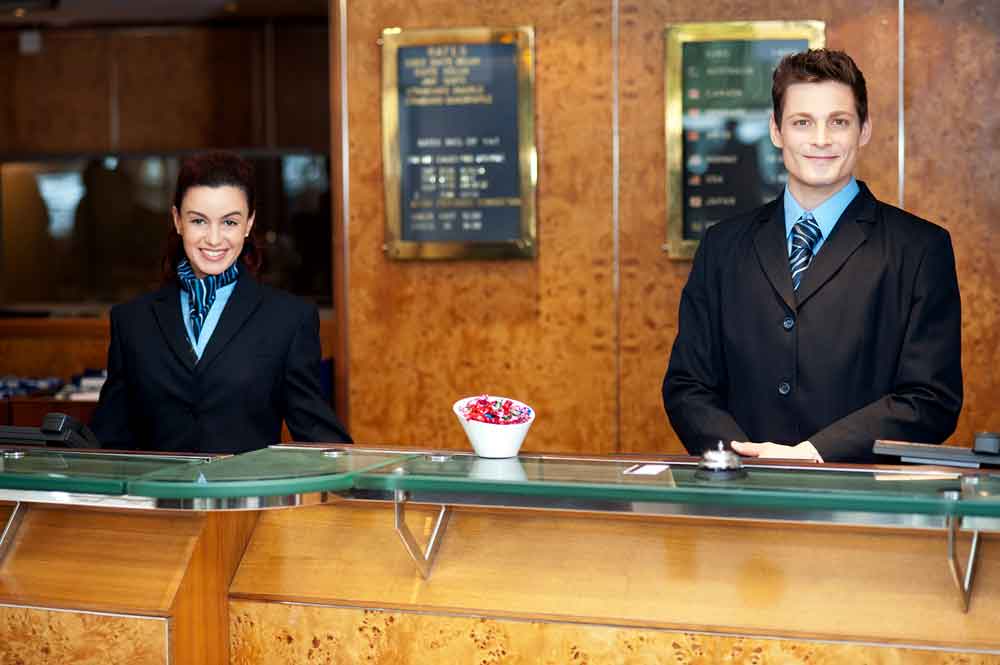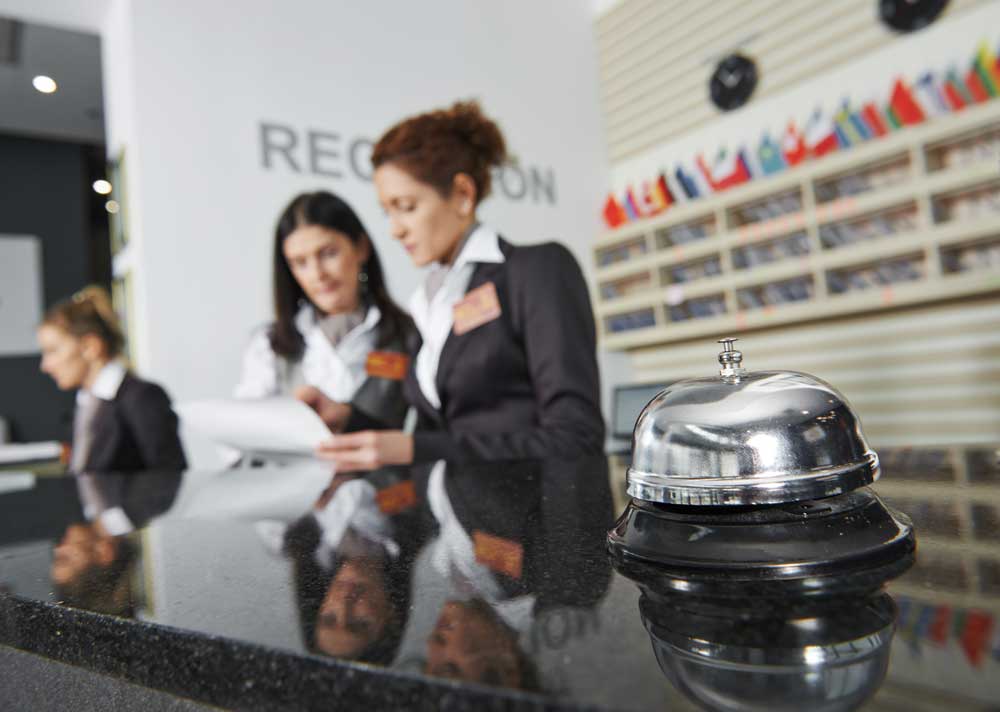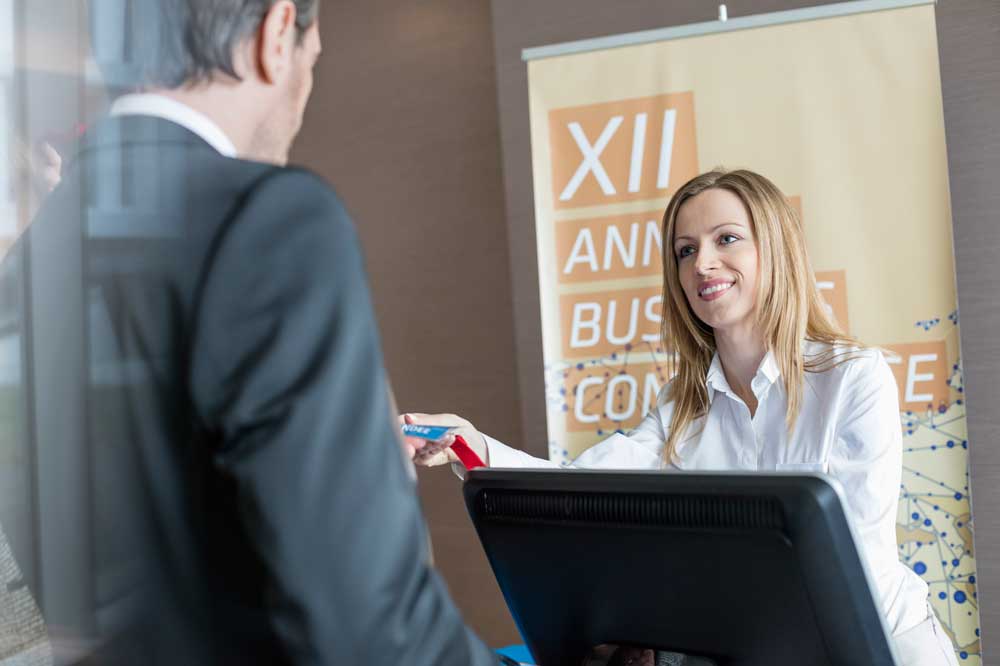In this section, we're going to look at a real incentive travel planner job description—as described by a professional; Martin Turner, former Director of Travel, International Travel Group, and former Global Head of Events, Credit Suisse.
A large proportion of the job of an incentive travel planner is focused on planning, managing, and co-ordinating the logistics involved in moving groups of people around over the course of a program. Typically, this will include:
Delegate registration, including all pre-event communications confirming travel itineraries, dietary requirements, etc.
Co-ordinating travel arrangements, arrival/departure schedules, etc.
Transport co-ordination, inc airport transfers and transfers between different venues/activities throughout the program.
Co-ordinating staff to ensure guests are supervised at every stage of the journey i.e. airport departures/arrivals, transferring to hotels, arrival at hotel, transferring between venues by coach etc.

Hotel management, inc rooming lists, check-in/hospitality information, arrival times, room drops for welcome packs/gifts, etc.
Venue management, inc main hotel event spaces/banqueting rooms, off-site venues, restaurants, etc.
Food and beverage planning, inc hotel banqueting event orders for onsite meals, and catering companies/restaurants for offsite meals.
Liaising with suppliers for offsite activities, entertainment, and excursions .

As incentive travel sits under the umbrella of corporate event/meeting planning, another large aspect of the job includes budget management, contract negotiation, and client account management/reporting. However, unlike a lot of other corporate events, there can also be a great deal of emphasis on the creative elements.
The leisure events and activities that make up an incentive travel program are intended, for the most part, to be a form of reward, and as such need to be stimulating and engaging.
If you’re the planner designing the content of the travel program, you must be able to come up with original and innovative ideas that your audience are going to connect with. What works for a group of car dealers isn’t necessarily going to work a group of pharmaceutical executives.
Therefore, in addition to the logistics and project management, an incentive travel planner also has to have a creative streak, in order to design memorable experiences for the clients.
This might include:
Researching and choosing the right destination to appeal to a particular group demographic
Creative event marketing and communications materials to inspire the delegates
Choosing high quality and memorable food and beverage
Choosing memorable leisure activities, tours, and room gifts
Having an attention to detail and adding creative touches to make each event or activity personal/unique
Adding VIP elements such as exclusive access to places, venues, or experts
Choosing the best restaurants and venues for receptions and dinners
Choosing the right type of entertainment, speakers, or theming & decor
Achieving the right balance with the type of events and activities over the course of a program i.e. the rhythm and flow of the program.
Now let's hear a first-hand account of an incentive travel planner job description from a professional:

Martin Turner is the former Director of Travel for International Travel Group and Global Head of Events for the investment bank Credit Suisse.
He began his event-planning career in Australia in 1981 and spent 16 years managing international group travel, conferences, meetings, and incentive programs for clients such as Toyota, Pepsi, Xerox, Time Magazine, and American Express.
After moving to the United Kingdom in 1997 he joined global brand experience agency Jack Morton Worldwide as Senior Logistics Director, before becoming Global Head of Events for Credit Suisse.
Since leaving Credit Suisse, Martin has worked for UBS, Barclays Capital, MJM Creative, and NetJets. Martin also teaches Event Management to Post Graduate students at Birbeck, Kings College, and UCL Institute of Education in London for the Ashdown Academy.
“It always begins with the brief and knowing what questions to ask the client. For me, it’s all around project planning, so ‘what do you need?’
I think of it a little bit like cooking in the kitchen. How are you going to get the entire meal out hot, on the table, beautifully prepared and done without burning the kitchen down or poisoning anyone. So, from the beginning when you get the brief, I’m immediately thinking strategically in my mind; ‘what are the things that have to happen?’ And that just boils down to communication; I think you just get sharper and quicker at it the more you’ve worked in the business.”
"For incentive travel events, you’re usually pitching a number of destinations to the corporate client, and then they decide which of those is most appealing. You have to attach your creative approach to each of the destinations with the same kind of verve, interest, and excitement—you can’t put all the energy into the one destination that you love.

You start by pitching the entire program, and you might have to give them four or five different destinations as options. This means you’ve got to prepare visuals, storyboards, or PowerPoint presentations for each. Usually, you have to present to a group of people who are making the decisions and, interestingly, with incentive travel—as in other corporate areas—the people who make the decisions are often the ones who have bad taste or don’t know the right direction to go in; so you have to be equally interested in all of them.
Often they’ll say ‘look, we’ve done South Africa, or we’ve done Thailand’ and there’ll be certain destinations, like Cuba or Rio, that maybe they’re quite keen on. Regardless of the destination, what’s vital is that you come up with a phenomenal program for each of the options you’re pitching.”
“When you’re preparing these presentations, you’ve got to think about the logistics of where all the attendees are coming from. So your first order of call in determining your program is understanding when they are going to arrive and when they are going to depart."
"You also need to consider how jet lagged they’re going to be. I have a rule of thumb, from experience, that you always have your first night event of any kind—the welcome party—in the hotel. Because if you’ve just flown in, checked into a hotel and unpacked, you do not want to go and get on a bus and go somewhere offsite—you just don’t.
However, that doesn’t mean you can just roll out a bog standard drinks reception in one of the hotel’s function rooms."
"It’s so easy in this business to just accept what suppliers give you, whereas I always want to push people to come up with something better. If I’m planning an opening dinner, I’m always very interested when I go on a site visit, to look at the various spaces within a hotel—to see whether we could have dinner by the pool for example. I absolutely do not want to put people in one of those typical ballrooms—and hotels will always try to do that because it’s the easy option. Please, I’d rather stick a pin in my eye!
I often look at spaces that they have, think about how big my group is and ask myself how special do I want to make it? Is there some sort of space in the hotel that isn’t generally used for events, but that looks really interesting and could be fun to use? Of course, sometimes you have to really twist the hotel’s arm to make things happen that are a little bit different."
"Then you have to come up with activities and excursions for the rest of the program. I like to approach it as, ‘how can you get under the skin of the destination?’ How do you create experiences for people that go beyond the regular tourist experience?
For example, when I was doing a program in Beijing, I took everyone to the Hutong area where they had afternoon tea in real people’s houses, then they went on a tour on bicycles to experience it like people who are living in Beijing would.
That’s something they’re going to come back and talk about at a dinner party. It’s the authentic experiences that make it amazing. A lot of people make the mistake of thinking that it means spending lots of money, and it doesn’t."
"Another example is an incentive program I did for a pharmaceutical company’s top performers who were coming into Australia. They all flew in overnight and because of that we left the first day open for them. I met them all at breakfast; I went around and said to them all, ‘you have the day free today, but would you like me to organize something for you to do?’ They all said yes and so I said, ‘I’ve got something great in mind and I’ll get you back here by three thirty.’
I called the hotel and told them I wanted picnics for everybody, and then I ordered two mini vans and took them all off to a kangaroo wildlife park where they fed kangaroos and koalas. Then I took them for a picnic on Palm Beach, where they film the TV show Home and Away, and we sat under the trees and had lunch. I knew of a secret place up there where we could go and buy big bags of fresh tiger prawns, so they all sat there and peeled and ate them.
These were really rich people with staff, yet they all thought it was wonderful—because often the best experiences are the simple ones that people maybe aren’t used to. It’s not necessarily about spending tons and tons of money."
"Of course, sometime you do have big budgets and you can really spend, but I still think it’s important to use the budget to create something authentic or unusual.
I once had to create a program for some of Time Warner’s most senior clients; the CEO of Sony and people like that. I had a group of 20 top CEO’s and their wives, with a pretty much unlimited budget to do something in Los Angeles. Everyone was quite sniffy about doing something in Los Angeles at first, like ‘urgh, LA; freeways and smog—boring.’ But I wanted to give them the Hollywood experience they’d never had; something that was really authentic—not the usual cliché Hollywood walk of fame type of thing.
That’s often the problem when you do incentive travel; you work with a local DMC (Destination Management Company) who knows the location, and they’ll just try to offer you the same old thing. Most of them hate me because I don’t want to settle for that. I’ll say ‘I’m sorry we’re going to dig deeper than that and come up with something original.’"
So, on the first night we did a dinner in the house that was used in the film The Bodyguard, which had just come out. Then the next morning, I arranged for the actress Barbara Eden from I Dream of Jeannie to come and join us for breakfast, then we all went up to her house to play tennis. Later, we did a cigar and whiskey evening with George Hamilton.
On another day, George Clooney hosted us on the set of Batman when they were shooting scenes in Wayne Manor. Then we sent them off to the Hollywood Bowl with picnic baskets by Wolfgang Puck.
On the last night we took over an amazing house up in the Hollywood Hills and I tracked down three Oscar winners—for screenplay, music, and costumes; I knew I wouldn’t be able to get actors—and we sat one winner at each table to tell them wonderful stories about life in Hollywood. We even used their Oscar statues as centerpieces surrounded by flowers.
"The thing with incentive travel is that you have to be phenomenally creative and come up with programs on a daily basis that are going to wow the audience—because they have been going on these trips for years and they’ve seen it all before.
You’ve got to apply that creativity to every aspect of the experience, from the big picture stuff to the small details. For example, you often have to provide a “turn-down gift” to be left in each guest’s hotel room with a letter explaining the following day’s activity or events. So you have to think about what wild and amazing thing can you do to make this more creative?
I remember doing an incentive program that was in London that had a dead day in the program where they could just spend more time touring the city. But they’d already had the chance to do that anyway, so I said lets lay on a surprise trip.
We just left a Swiss Army knife on everyone’s pillow that night as a turn-down gift. In the morning, we flew them to Geneva, and then helicoptered them on to Zermatt to have lunch up a mountain. They were then helicoptered back to the airport and flown back to London. They left at seven in the morning and were back by seven in the evening, but they’d had a long lazy lunch up in the mountains of Switzerland. Well they loved that!”
“It’s not just about coming up with the creative ideas though; you’ve also got to be able to plan and organize everything meticulously. There’s all the logistics involved in moving people around, organizing flights and coaches, getting them to the right place at the right time and all of that.
This is the thing about the events business, if you are going to be really successful you can’t only be a creative and ideas person. You’ve got to have tenacity and master the detail; you’ve got to be able to deal with the logistics and the admin—and make sure the accuracy is there with the budgets. If you’re going to come up with a creative idea, you’ve got to know you can deliver it.
I generally always work with a DMC when it’s an international destination, for the simple reason that I believe you’ve got to have local experience and knowledge. If you’re organizing a dine-around at local restaurants, you need to know the reputable places to go—that their health licenses are all good—otherwise you could end up somewhere terrible.

You need to know things like whether your coach transport is insured, or that they have a driver who knows what he’s doing. They also come in handy early on when you’re pitching the initial ideas to your clients, because you’ll need to have several options on hold; you should never pitch something that you can’t give someone. So I tell the DMC to hold things on option for two weeks. I tell them I’ll be presenting to the client on this day, I will let you know what their feedback is, the client will be advised that we’re holding all the destinations, and they have to commit to one of them by this date. The worst thing that you can do is suggest things to a client that you actually can’t deliver. Researching and reserving all the options is a big part of the process early on."
"The next step is how you communicate the program to the people attending. Again, that comes back to being as creative as you can.
For example, if you’re doing an incentive program to New York you might send out a beautiful box with a big apple in it, accompanied by a scroll outlining the details of the program. There are all sorts of things that you can do to be creative when sending invitations out to people.
All of this might sound really creative and exciting, but of course, there’s a lot of the job that isn’t very glamorous. Behind all of this, you really need to have done a complete project plan for the entire thing; identifying the deliverables on every single aspect in the program.
Along with that is the finance. You need to be a budget person. You must be able to understand and control budgets—and if you don’t have Excel skills then you have to go out and get them, because you have to do a really good budget.
Along with that is the finance. You need to be a budget person. You must be able to understand and control budgets—and if you don’t have Excel skills then you have to go out and get them, because you have to do a really good budget.
Personally, I love doing the budgets, but a lot of people don’t like them. I love them because they make me feel safe. Once I know that I’ve accounted for everything in the budget, it becomes a visual checklist, and I know that I actually have everything covered. Once you’ve got everything mapped out in a budget, it gives you the opportunity to go through and examine the details. For example, have you budgeted for water to be on board the transfer coaches from the airport to the hotel, because you are going to a tropical destination and it’s going to be hot?”
“In order to pull together the budget, you’ve got to liaise with various suppliers and think about what the most effective way is to achieve something.
For example, for your flights, you’ll go directly to the airline to get your costs, but for the hotel contract, you might consider booking this through the DMC.
The DMC might have a better relationship with local hotels if they’re doing multiple bookings with them throughout the year, whereas I might not be using that hotel again for another five years. This way, I’ll still be able to get a commission and a lower rate by booking through them. I always check out both options; booking direct or through the DMC."
"Your DMC can help you book all sorts of things, from coaches to restaurants, and even things like turn-down gifts. Anything you can buy or source locally is the way to go.

If you start trying to take things from your home country to an international destination, you’ve got to get things into the country, you might have customs issues, you have the risk of something getting damaged in transit, or what happens if you suddenly have another three people attending and so you don’t have enough of something? You really want to try to get everything locally with the help of the DMC."
"What I try to do for the simplicity of accounting is to centralize as much billing as possible; so the more of the smaller things that you can purchase through the DMC the better, and that makes your life easier as well.
Of course, in addition to your project plan you then also have to have a payment plan, because if you have monies that are due to all of your suppliers, you have to balance that with when you’re billing your client. You need to have that money coming into your account first; you can’t be carrying the costs for the client.
You’ve also got to make that really clear to your client at the offset and people who have been doing incentive travel for a long time understand that. Often, you are talking about lots of money; some of these programs can run into £1, 2, 3 million depending on whom you are dealing with.

It’s a hugely responsible job, which means you have to pay just as much attention to being a budget person and a strategic planner by putting together a thorough project plan. Being creative is fantastic but it’s absolutely useless if you don’t follow up with all of the other stuff.”
“When it comes to going onsite, we’ll then assign different members of the team—or freelance event managers—to oversee each of the different areas of the event. For example, someone might be responsible for transportation; making sure that all happens smoothly is a huge job.
Someone may be assigned to managing the events office to deal with all the calls and messages that come in, because often the number of the event office is publicized to wives, girlfriends, families, assistants, and colleagues and they all phone in with messages that need to be delivered—there’s a whole on-site office that has to be run.
That person might also be coordinating all the turn-down gifts every night—which often happens on an incentive program— because people only deal with information when you give it to them, so you have to drip feed it throughout the program.

So you do that in a turn-down note, often with a little gift, which is delivered to every guest’s hotel room. It’s a hugely responsible job to make sure that all those things get delivered to the right hotel rooms and sometimes you have to send one of your staff to go round with the hotel team to make sure it goes to all the right rooms.
Then sometimes the gifts are personalized, so if a signed copy of a book made out to John gets delivered to the room in which Peter is staying you’ll be screwed, and you can’t trust the hotel staff to get that right."
"Another area of the event you might be responsible for is the catering; all the food and beverage in the hotel, or all the offsite catering. Often that’s split between two people because it’s very difficult for one person to do both, because you’re either onsite or offsite.
The other thing on an incentive program is that you usually have large amount of activities that people sign up to do. It’s a bit like being on a cruise ship, but on land.
Sometimes you’ll have staff that’ll be responsible for nothing else but dealing with the optional program—which might be horse riding one afternoon, then kayaking another
Then there are all the gala dinners and they usually have some form of entertainment, so someone has to be responsible for the talent.

This might involve getting them into the venue, making sure that they get their rooms, that they get fed and have transport arranged to get them home, or that they rehearsed and had time to do a sound check in the room before the guests arrive.
So while you might be working with a DMC on site, what you don’t do—ever—is relinquish responsibility to the suppliers that you work with. You need to manage them and your expectations, so there’s a huge amount of things to balance on-site.”
Read the pros and cons of being an incentive travel planner by Martin Turner, former Director of Travel, International Travel Group, and former Global Head of Events, Credit Suisse.
